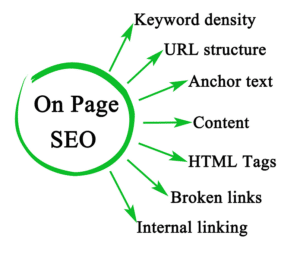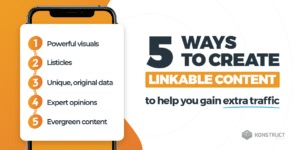SEO for a New Business – 7 Strategies to Take You to the Top of the SERPs
Let’s face it.
The world of business has become cutthroat. Especially when it comes to launching and marketing a new business or product.
With big players commanding the lion’s share of the market, it’s easy for you to feel like a tadpole among sharks. Daunting as it may seem, getting your new business to rank well on the search enginesis doable. All you need to do is employ the right strategies.
And that’s exactly what we’ll be looking at today – SEO strategies to help your new business rank. With a new and novel product, it is possible to show up in SEO rankings.
But first…
Importance of SEO for New Businesses
SEO is a discipline as old as the internet itself. And while many have declared it dead, it’s a discipline that every business needs to employ – and an essential one at that.
Here’s why SEO is important and why you must invest time and resources in it:
You Want to Be Found
You may have paid a web developer to design the most beautiful, user-friendly website on the planet. But if nobody ever sees it, that money was wasted. Many web developers don’t understand on-page SEOand don’t include it as part of their website development packages.
Hiring an SEO expertto audit your website is the best move you can make on your journey to getting your company in front of those searching for what you do/sell on the internet. This expert will perform keyword research based on your industry and edit the headlines/text/URLs, metadata, alt text, and more to align with the keywords that potential customers are typing into web browsers.
Once the SEO expert has implemented this on-page SEO strategy on your website, your website will get crawled by Google and other search engines and will slowly start to work its way toward the front of organic search engine results. This effort comes with a cost, so include a website SEO auditin your SEO budget.
As a startup, you need to be found to get new customers.

Brand and Product Awareness
One of the most important reasons you need SEO is that it’s an excellent strategy for increasing your brand awareness. And if you’re launching a new product, it can help you drive product awareness.
That’s because SEO, executed properly, will help you get many eyeballs on your new business/product.
Credibility
Having a website optimized for SEO within your industry gives your company higher credibility than those companies lacking an internet presence.
If your company is easily found for terms relevant to your industry and is listed in multiples ways (for example, your website comes up in search, you have a Google My Business Profile, and your Facebook page appears in search), potential customers may see your company as more legit. They will have confidence that you know what you’re doing and can help them achieve the goals they need to meet.
If a potential customer can’t find any evidence of you online, they may think twice about hiring your company.
You Want to Better Target Your Marketing
There are free SEO tools available at your fingertips. Take Google Analytics, for example. Be sure you install Google Analytics 4 on the back end of your website as soon as possible. It will start tracking activity to your website and activity on your website. Review these stats regularly; they will give you free SEO information you can use to better target your marketing efforts.
Google Analytics will tell you what keywords people used to reach your website and what pages are getting the most traffic. It will tell you what content is being well-received by potential customers and what is not. The keywords you get from Google Analytics can be used to better optimize future content on your website and can also be used to help set up advertising.
Lead Generation
The core function of SEO is to drive traffic to your business website. But not just any kind of traffic – relevant traffic. This means visitors to your website who are likely to turn into customers.
This is lead generation.
And as you well know, leads are the lifeblood of every business. Without good leads, your bottom line will plateau, or worse, tank.
Content Is King
A large part of showing who you are as a company is showing how you solve your customers’ pain points. But don’t just focus strictly on discussing your products and services. Consider sharing customer testimonials, insider info, tips and tricks, informational blogs, and industry news.
A content marketing budget is essential to startups since great content assists with improving SEO, showcasing your industry expertise, and setting up authority and trust with potential customers. Budget for writers to create quality content and for an SEO professional to optimize that content.
By investing in helpful, shareable content that relates to your industry and what you do as a company to solve problems for your customers, you are creating engaging content that will keep people coming back for more.
Build a Community
Your content strategy can also help you build a following and an online community. By creating shareable-worthy, SEO-optimized content that showcases your industry expertise and helps solve customers’ problems, you will build a following of those who truly value your content and will share it with others.
They will turn to you regularly as a thought leader and for assistance with issues they are having. You will build a community of people who can become champions for your business and brand. You will build customer loyalty through content marketing. This is why dedicating a significant amount to a content marketing budget is important.
Sharing your content will also help with your search engine rankings, as the more traffic your website gets, the better your website rankings. If others start placing links to your content in their blogs or on their website, these “backlinks” will also help increase your search engine rankings.

Overtake the Competition
Need to beat your competition?
SEO can help you do that.
By having a robust SEO strategy, you can catch up and even overtake your competition – even the old guards in your niche. A well orchestrated SEO strategy can help you drive valuable traffic to your website, resulting in your revenue going up.
How?
By implementing the 7 SEO strategies below. So, let’s get to them, shall we?
Before the 7 Steps: Set Goals
Everyone has the same goal in mind when it comes to SEO: boost organic traffic and turn prospects into paying customers. While it’s a great end goal, you also want to achieve other successes with the strategy you worked so hard to create. Goals could include:
Goal #1: Rank in the top five for a certain high-ranking keyword of yours for five months.
Goal #2: Get 20 high-quality backlinks to a particular page over three months.
Goal #3: Increase time visitors spend on website.
Achieving smaller goals helps you dial in on the intricacies of your strategy and not just focus on one big goal. With your goals set in place, let’s find out how to achieve them.
7 SEO Strategies to Help Your New Business Rank Well
Ready to push your new business to the top of the search engine results pages (SERPs)?
Then let’s get to it, shall we?
1. Build an SEO-friendly Website
For Google to find you and crawl your website, your technical SEOneeds to be top-notch. Without Google indexing your website, you won’t see any results. Technical SEO includes some of the following:
- Filling in your metatags
- Having titles of the appropriate length
- Not having too many redirects
- Add internal links from pages on your website to your other internal pages
- Make your website mobile-friendly
The first step in ensuring your new business stands a chance of ranking well on SERPs is building an SEO-friendly website. This is a website that is easily accessible and indexable by search engines and is known as the practice of Technical SEO.
Some qualities of such a technically sound website include:
- Mobile responsiveness
- XML sitemap
- Meaningful page structure
- Fast load speed
- Optimized URLs (descriptive and unique for each page)
- Images optimized for SEO (lightweight and with ALT text)
An SEO-friendly website is the gateway to online success, especially for a new business. Don’t just focus on aesthetics when building your website. Instead, make sure your website is also functional and, especially, SEO-friendly.
2. Conduct Competitor Research
One mistake many new businesses make with their SEO strategy is to neglect to research their competitors. Especially if your business is new, you must check out what the competition is doing. Find out:
- What’s working for them (keywords, backlinks, content, etc.)
- What’s not working
- Any gaps you can exploit
This is valuable information that will help you better position yourself for success. It will also help you reverse engineer the aspects of their strategy that are working and implement them in your strategy.
The biggest advantage of competitor research is that you don’t have to re-invent the proverbial wheel. And you don’t have to guess at which keywords and content types work best for your target audience. You get all that data from checking out your competitors. And no, you don’t need a connection in the CIA to pull this off. All you need is a good competitor analysis tool.
3. Create SEO Optimized Content
You’ve probably heard it a gazillion times – content is king. The simple reason for that is that content plays a huge role in SEO.
That’s why you must invest in SEO optimized content if your new business is to succeed at climbing to the top of the SERPs. It’s also why every business needs to start a blog.
So, what does SEO optimized content look like?
Includes Target Keywords
Keyword research is the foundation of SEO optimized content. Be careful, however, not to keyword stuff. Instead, aim for a keyword density that’s between 1%-3%.
Long-tail keywordsget a smaller amount of searches because of how specific they are but they often convert better. They’re also less competitive and easier to search. These phrases often contain three to five words, one of which is usually a keyword associated with your main topic.
Short-tail keywords contain up to three words about a broad topic. These keywords have a high search volume, high competition, include generic search terms, and don’t covert as well as long-tail keywords.
Once you have determined both your long-tail and short-tail keywords and implemented them into your content and onto your website, Google will rank your pages, ideally near the top of the search, getting you organic traffic in return. How do you find the keywords, though?
Step 1:Brainstorm your “seed” keywords — AKA the terms that would be commonly searched for your brand. Make a list of these and keep it handy. To start your brainstorming session, you can use Google Search Console. This tool monitors your website’s performance and gives you insight into your best-ranking keywords.
Step 2: Research your competitors — what keywords are sending traffic to your competitors’ websites? Identify your competitors, then search your keywords from your seed list and see which competitors come up on the first page. Build another list of your competitors and the keywords they are coming up for.
Step 3:Content, content, and more content: Use all of your keyword lists to create one more important list: a content list.
For a new business, we advise that you research untapped keyword opportunities. These are usually long-tail keywords that have more than two words in them. Research proves that more than 50% of all search queriesare done so using long-tail keywords.
Create Content
Your mounds of keyword lists are useless if you don’t put them to work for you. How are you going to incorporate your keyword research into useful content on your website?
- Determine content type based on what’s appearing in the search engine for your top-ranking keywords. Is it mostly blogs, videos, or podcasts appearing? Whichever is most popular, focus on creating that type of content. What is the format of the content? If blogs are the popular content type, is the format of the blogs a list, news, or reviews?
- When creating the content, it’s important not to keyword stuff and that your content is unique to you and your brand. Google values content that is trustworthy and expert-level. Try getting quotes from experts or adding in your own thoughts and experiences in order to differentiate your content from others’ content.
- Go mobile-first. With mobile being the go-to place for search, it likes content that is mobile-friendly.
Use this information to plan your content while incorporating your keywords. Next, publish the content and then repurpose it. If you started by publishing blogs, use a topic from it to create a video. When you develop different types of content it allows you to be wherever your audience is.
As for placement, make sure your keywords are in:
- Your Headline
- The first and last 150 words of your content
- Your headers
- In the posts URL
Well Formatted
Format your content with HTML tags. These are H1, H2, H3, etc., headings. They make your content easier to read for search engines and readers alike.
Besides HTML tags, make sure to use:
- Short sentences and paragraphs
- Bullet points
- Images
Doing so makes your content punchy and easy to read.
Has Internal and External Links
A linking strategy is crucial to creating SEO optimized content. Both external and internal links must be strategically built to give your content a good chance of ranking well.
Meets Google’s E.A.T Standards
This simply means your content must be:
- Expertly written
- Authoritative
- Trustworthy
Creating SEO-optimized content should be the core of your SEO strategy as a new business (even more important for SaaS brands). It will help you be more visible as well as give you an opportunity to educate your target audience about your business.
4. Optimize for Voice Search
Voice queries have fast become popular thanks to smartphones and voice-activated devices. That’s why you must also optimize for voice search. Don’t worry; it’s not as difficult as it sounds. You mainly have to focus on creating content that:
- Answers questions (FAQ pages are great for this)
- Use conversational language in your content
- Optimize your Google My Business (GMB) page
- Focus on long-tail keywords and phrases
- Create location-specific content (most voice queries are location specific)
With the IoT revolution gaining momentum, voice queries are fast becoming more popular than typed queries. Position your new business well by optimizing for voice search.
5. Build Quality Backlinks
Another important ranking factor that can’t be overemphasized when creating an SEO strategy for your new business is building backlinks. That’s because backlinks signify to search engines that your website and content are trusted sources of information.
So how do you build backlinks to your new business website?
Here are some strategies you can use, especially on a shoestring budget:
- Guest post. Creating content that you publish on websites other than your own is the easiest way to build quality backlinks.
- Create link-worthy content. This is content others won’t hesitate to link to. A great example is original research.
- Participate in blog round ups. This is content created by many contributors chipping in.
Quality backlinks may take time to build, but they always pay off.
6. Don’t Ignore Metadata
Metadata is the information that shows on SERPs when your website comes up for queries. It’s mainly made up of two elements:
Title Tag
This is the headline that shows up on SERPs and can sometimes be different from your blog post/article’s main headline. Make sure to optimize it by:
- Including your target keyword as close to the beginning of the title tag as possible
- Keeping it within a 60 character limit (characters after this are truncated)
Meta Description
This is the short description that appears below your title tag. An optimized one makes it easy for search engines and readers to know what your page is all about. A few ways to optimize it include:
- Using your target keyword in the description
- Keeping it within a 165 character limit
- Use action words to encourage clicks
- Show the value of reading the post
Never let search engines automatically generate your metadata. Optimize them yourself to increase the chances of ranking well.
7. For Brick-and-Mortar Businesses – Optimize for Local SEO
If your new business is a brick-and-mortar establishment, you still need to have a web presence. One that is optimized for local SEO so as to drive foot traffic. Here are a few ways to optimize for local SEO:
- Optimize your Google My Business (GMB) listing
- Identify and optimize for local search terms
- Create location-specific content – especially on critical pages like your Home, About, and Service pages
- Optimize for voice search
- Make sure your website is mobile-responsive
Just because your business depends on physical foot traffic doesn’t mean you should ignore SEO. Especially since research shows that about 88% of people research a product onlinebefore buying – online or in a physical store.
Why Is a Content + SEO Budget Important?
Marketing supports sales. SEO can help you get more leads/sales.As a startup, your initial sales usually come from referrals, which will only take you so far.
Search Engine Optimization (SEO), as well as your ongoing content creation, is so important for setting up visibility and getting sales/leads from those searching online for the products or services you offer.
Ever heard the saying, “You have to spend money to make money”? That’s what it comes down to with marketing. Without marketing, people won’t know about your company and won’t see the value you bring. And with startups, your SEO budget is where to begin!
SEO for New Businesses – Ranking High is Possible
Just because your business is new doesn’t mean it should languish in the digital doldrums. By taking proactive action and optimizing for SEO, you can gain a lot of traction that will result in increased brand awareness and more leads.
If you have a revolutionary product or service that you need help getting out there and aren’t sure what next steps to take, RevenueZen is a proven B2B SEO Agency and we’d love to help.




